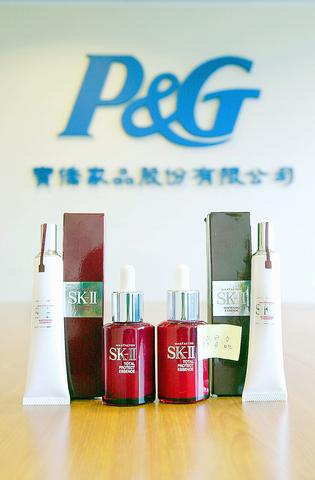The Taipei Bureau of Investigation (調查局台北調查處) busted an underground Taipei County factory recently for allegedly manufacturing counterfeit cosmetic goods. Investigation officials apprehended an "undisclosed number of people" at the Sanchung City facility and confiscated a large quantity of fake product and product packaging.
The counterfeit product -- Procter & Gamble's (P&G,

PHOTO: CHIANG YING-YING, TAIPEI TIMES
The two-year investigation came to light Oct. 30 as Bureau agents swooped down on the Sanchung factory and seized 300 tubes of fake SKII -- valued at NT$690,000 -- and over 10,000 fake trademark labels.
Seeking to address consumer safety concerns over the fake products, P&G public affairs manager Jane Su (
The official said the fraudulent products usually turn up in small private cosmetic shops, beauty supply stores and import product speciality shops. Fakes are a dead-giveaway as they usually retail for more than 20 percent less than the real thing. A 30gm tube of SKII Whitening Essence retails for approximately NT$2,300.
P&G estimated losses from the Sanchung incident alone will cost them more than NT$10 million.
P&G officials say consumers familiar with SKII can distinguish real and bogus products by fragrance and packaging color variations -- fake SKII packaging is darker burgundy and lacks the glossy silver label. Su said consumers can be assured they have bought real SKII products if they make their purchases from department stores or Max Factor specialty stores.
Meanwhile, investigation officials remained mum on details surrounding the Sanchung bust, saying they "didn't want to jeopardize the investigation by making their findings public."
The official said the problem is not limited to Sanchung as Bureau investigators have also nabbed several individuals in a Chungho City factory for printing fake SKII packaging. Punishment for counterfeiters in Taiwan -- according to another Bureau of Investigation official, Lee Yi-hsiung (
The fine for intent to defraud by means of producing false product labeling is a violation of Article 62 of the Trademark Law, and punishable by imprisonment of no more than three years, or a fine of no more than NT$200,000, according to Winifred Tung (童文薰), an attorney at Qi Lin International Law Office (齊麟國際法律事務所). Most copyright infringements usually result in monetary fines only.
P&G's Su said the company believes the perpetrators should be penalized to the full extent of the law and indicated they will seek compensation of up to NT$100 million.
Tung advised P&G to strictly self-monitor sales outlets and help to ease the burden on consumers by finding new ways to distinguish their products from bogus ones.
However P&G emphasized that while they have used various design alterations as a deterrent, "Taiwan is the counterfeiting kingdom," and little can be done to stay ahead of counterfeiters.

SEEKING CLARITY: Washington should not adopt measures that create uncertainties for ‘existing semiconductor investments,’ TSMC said referring to its US$165 billion in the US Taiwan Semiconductor Manufacturing Co (TSMC, 台積電) told the US that any future tariffs on Taiwanese semiconductors could reduce demand for chips and derail its pledge to increase its investment in Arizona. “New import restrictions could jeopardize current US leadership in the competitive technology industry and create uncertainties for many committed semiconductor capital projects in the US, including TSMC Arizona’s significant investment plan in Phoenix,” the chipmaker wrote in a letter to the US Department of Commerce. TSMC issued the warning in response to a solicitation for comments by the department on a possible tariff on semiconductor imports by US President Donald Trump’s

‘FAILED EXPORT CONTROLS’: Jensen Huang said that Washington should maximize the speed of AI diffusion, because not doing so would give competitors an advantage Nvidia Corp cofounder and chief executive officer Jensen Huang (黃仁勳) yesterday criticized the US government’s restrictions on exports of artificial intelligence (AI) chips to China, saying that the policy was a failure and would only spur China to accelerate AI development. The export controls gave China the spirit, motivation and government support to accelerate AI development, Huang told reporters at the Computex trade show in Taipei. The competition in China is already intense, given its strong software capabilities, extensive technology ecosystems and work efficiency, he said. “All in all, the export controls were a failure. The facts would suggest it,” he said. “The US

The government has launched a three-pronged strategy to attract local and international talent, aiming to position Taiwan as a new global hub following Nvidia Corp’s announcement that it has chosen Taipei as the site of its Taiwan headquarters. Nvidia cofounder and CEO Jensen Huang (黃仁勳) on Monday last week announced during his keynote speech at the Computex trade show in Taipei that the Nvidia Constellation, the company’s planned Taiwan headquarters, would be located in the Beitou-Shilin Technology Park (北投士林科技園區) in Taipei. Huang’s decision to establish a base in Taiwan is “primarily due to Taiwan’s talent pool and its strength in the semiconductor

French President Emmanuel Macron has expressed gratitude to Hon Hai Precision Industry Co (鴻海精密) for its plan to invest approximately 250 million euros (US$278 million) in a joint venture in France focused on the semiconductor and space industries. On his official X account on Tuesday, Macron thanked Hon Hai, also known globally as Foxconn Technology Group (富士康科技集團), for its investment projects announced at Choose France, a flagship economic summit held on Monday to attract foreign investment. In the post, Macron included a GIF displaying the national flag of the Republic of China (Taiwan), as he did for other foreign investors, including China-based